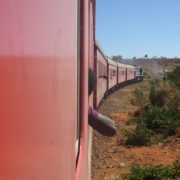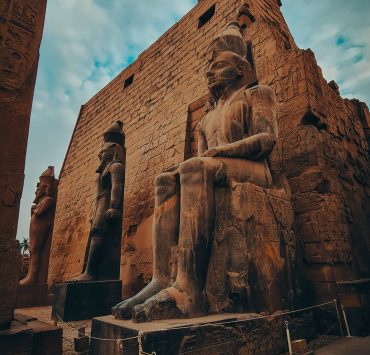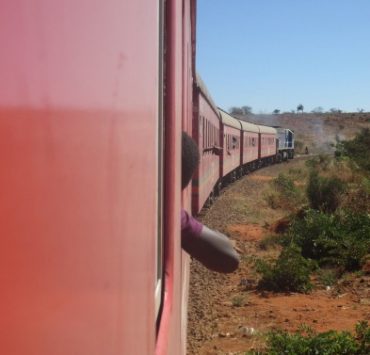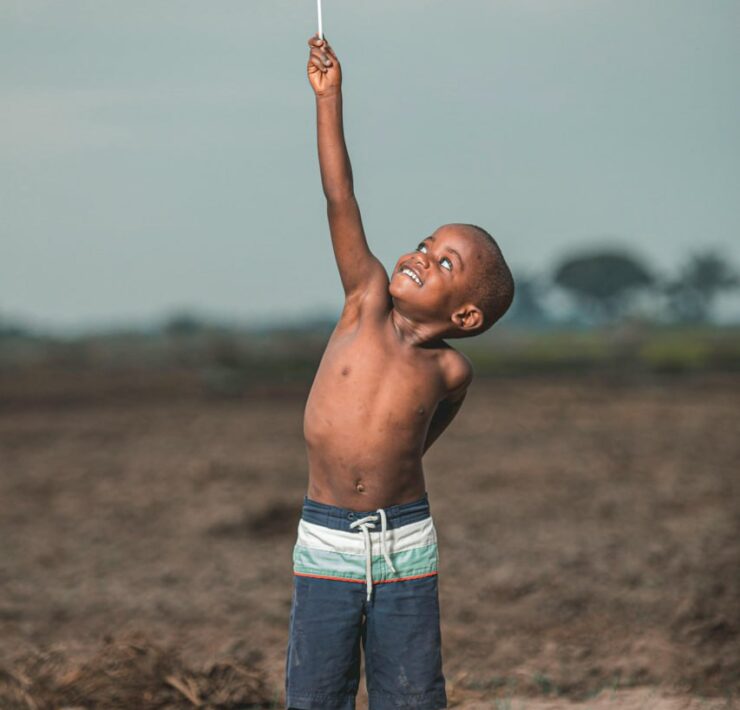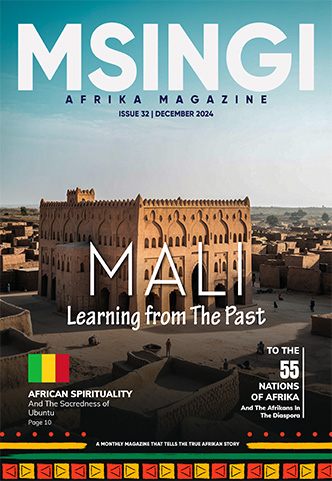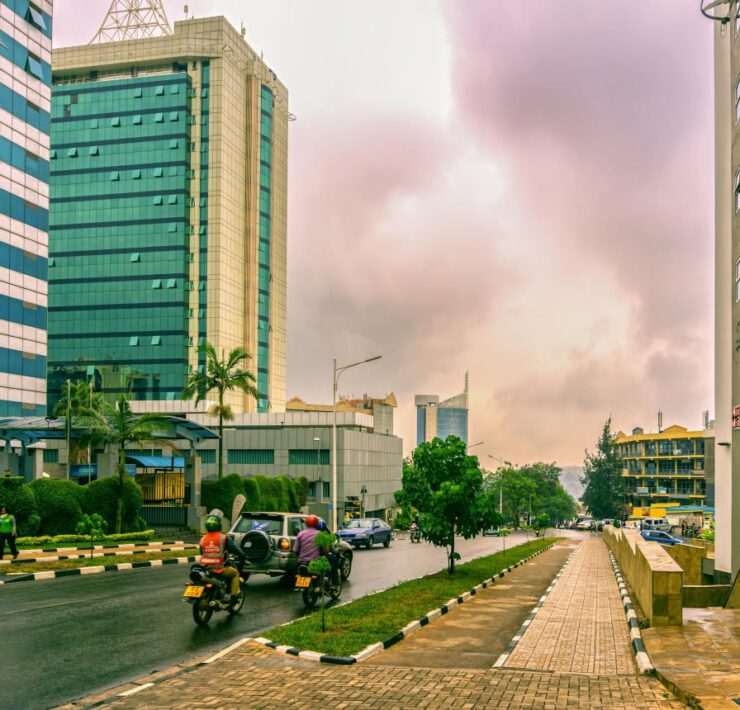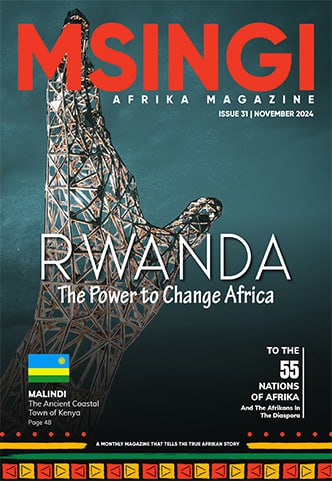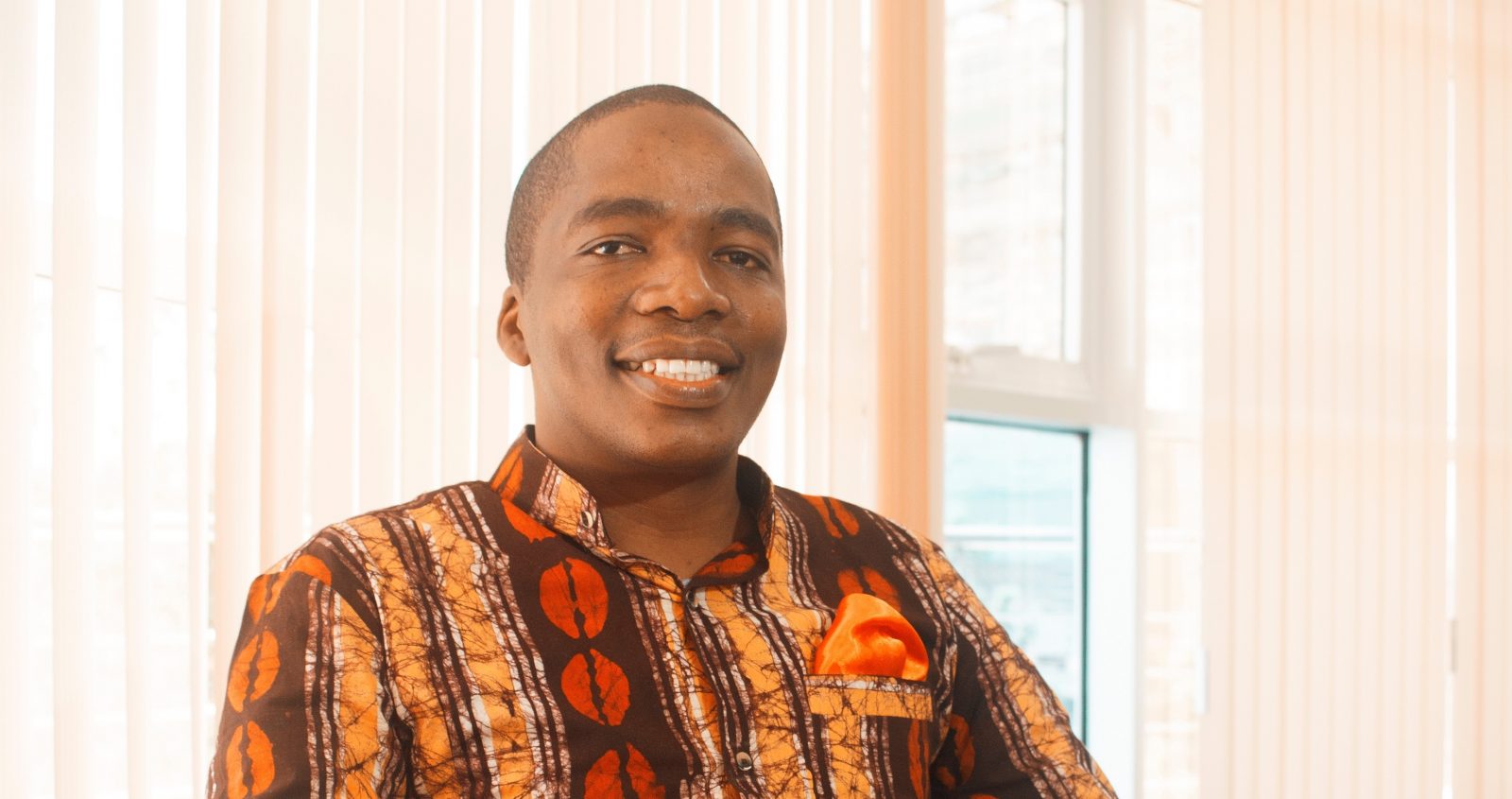
Passionate about getting God's message concerning Afrika and the end…
Read Next
The other day my husband said to me that people don’t often calculate what it means to live out your mandate in fullness, what it looks like when you go to the streets. Because your experiences on the ground can actually wear you out, they can cause you to pause, they can even cause you to shrink back from the purpose that you are meant to be living out. There is a price that has to be paid, there’s a sacrifice to be made.
But when we engage ourselves and make the sacrifice, the impact that our lives can have on just one person or an entire community of people is monumental. Today we are speaking to John Wills Njoroge, one man who has made up his mind that he’s going to focus on transforming the hearts and minds of young men and families in Kenya and Afrika, in order to bring about a change that is genuinely transformative, and genuinely from the root of the community, not superficial.
Thank you so much John for joining us, and thank you for giving us this opportunity to spend time with you today.
Thank you, I appreciate it.
We’re really grateful. Please could you tell our audience about yourself, about your background, and your experience and training?
My background and training, I started with seeking to understand what the Kingdom looks like. That is why I ended up in a seminary, and the only lecture I heard about the Kingdom was by a certain lady who was fired after that semester because I think she knew her thing, and I don’t know what happened. Then after that, I did International Relations and Security Studies just to understand global politics and how they affect domestic politics, international political economy, and security.
Understanding Afrika, Afrika’s role in global affairs, then I combined that with psychology; how people behave. Actually I really wanted to take anthropology. But I think I will. But the most important thing for me is to understand how the world functions outside the box.
Okay. So if I can just go there a little bit, what is your fascination with the way things were and why exactly are you so interested in how things work and how they interrelate?
I think that, for me, the most important thing is getting people to look at the boxes that they are in, you know that thing of thinking outside the box. And sometimes they find it hard because the only way to think outside the box for them is embracing the box that they are in. What I find fascinating, for me, is someone who gets to a point where they’re able to articulate their vision, and their mission in life, outside our social addictions that restrict our societies and families. So, when a person comes and asks me, “What do you think I should do?” My question to that person is, “What are you here for?” Because if you’re able to answer that question, then you will not be seeking to know what you need to do from other people, because everything is in you by design.
Yeah, that’s awesome. I completely agree. Now, having known you for a few years, I know you have a very serious passion for transforming young men’s hearts and impacting them in a really positive way. Could you tell us a bit about that and the why behind it?
Actually, the drive is an empowered and dignified continent, a story that was born through my experiences in life by, and I have, I would say three players in that story. One is an elderly lady, and then two men. So, the two men, one of them is my former high school principal, who got to know that I didn’t have a father. And he became a father. So, he told me, “Anything you need, just let me know. I’m here for you.” Now that story came from a situation where I was involved in a strike, in school, and I was among the students who led the strike. And so he called me and said, “You know, if I kick you out of this place, that’s it. And there’s no way I’m going to expel you. If you can convince this number of students to go home, then I think you’re a resource.” So we walked together. After high school, I was heartbroken, because that was a transition of separation from my father.
And then one time I was in a meeting somewhere. These people who were praying for the country. So, after the prayer meeting this man walks to me and he says, “I think God is asking me to be your father-figure.” And so I told him, “No, I don’t take those things of ‘God said’. It’s okay, you can be my friend.” The funny thing is that he was consistent. And he walked with me, even paid my dowry when I was getting married. And he’s a stranger. The third person is an elderly lady who taught me a lot. I called her cucu (grandmother) because I lived in their family. She used to run a shop and she also used to cook for the guys who were involved in construction around that place. And, by the end of the day, every evening she used to invite children and these kids would take whatever is in that shop. And one time I asked her, “How does this business make sense?” And she said, “No, it’s not about this business making sense. It’s about dignifying people. So there is no way this child can go home hungry when I have food here.” So, she used to give a lot and when she was dying she is one lady who died empty, I must say, because she gave everything.
All of these stories have foundational impact. Absolutely. Not just even for you, but now even through your life to the lives of others.
True, and I think one of the things that has helped me a lot is the nuggets of wisdom that I received from these people. One, from my former high school principal, when I was leaving, because from Form 2 to Form 4 I was a senior captain, and I was never punished. So, he said “There’s one thing I want you to remember in life, that humility is the most important thing.” And how he did that he called me and said, “I just want you to give me a chance to spank you.” I said, “No. How do you spank me? There’s nothing I have done.” “No, no, no, I’ll tell you why. So, allow me to spank you, then I can tell you why.” I said, “No.” He asked me “Do you trust me?” I said, “Yes, I do.” “Then allow me to spank you.” I said, “No.” So, I just agreed and he spanked me and he said, “You know, when you go out there always remember that little pain that you felt as a reminder that you are a product of this community and you are not a self-made man.”
Then, this other gentleman, for him there’s nothing big, as in there’s nothing overwhelming for him. Because he believes that God is present. He believes that we are here for a purpose. And he also taught me that money is not everything. Human capital is the most important thing. And he avoids ‘human capital’. He says, “Don’t be insulated. Make sure that you have the human connection.” And for this lady, she said, “Give the best you can in the society.” So, as a result of that for the work that I do, anything that I am involved it’s to empower, to dignify. And empowering involves communicating by giving knowledge, then enlightening the hearts of people and allowing these people to be involved, engaged in what in what you’re doing. Simply creating a web in the society where people can hold each other and rise up.
That’s beautiful. I love it because increasingly in society, what’s happening is that people are being taught how to be isolated. So, do you find it challenging to bring people together? Are they responsive to the ideas and suggestions that you make when you go out and reach out to them?
I would say actually, that is working, but I find it working more among the broken. And this because when I’m working with people, in the informal settlements, for them, they have human connection. When I’m working with people in prison, they have human connection, these are people who have reached this space where they’re saying that “I’m grateful this thing happened, because I met myself.” And I am not in any way advocating poverty, and pain and all those things. But I think these are people who’ve reached a place where they are not addicted to individualism, they have moved from isolation. And, even though some of them are facing depression, anxiety, and such things, they have someone to talk to, and so, that helps us intensify our support, especially for such groups. I also volunteer in hospitals, I remember there is this one time I was in a private hospital and someone, one of my colleagues said, “You know here you will have a hard time, because when you’re helping the middle class, they will be asking you about your qualifications. But when you’re helping people in a public hospital, they are willing to receive, because that’s the best they can get as a result their socio-economic situations or circumstances. So, there’s a lot of isolation in our society, and how is the isolation built? It’s simply by us moving our identity from who we are, to the things that we have. By doing so, we are building walls, by doing so, people will interact with you based on what you do, or where you work, not necessarily because you’re a human being. So, our drive here is to help people remember that they’re human beings, and they can connect and support each other.
So you work a lot with young men.
Yes.
Could you tell us why and what kind of work you do with them?
Thank you. I think one of the things is that I grew up without a father. Then there were these two men who intervened. Then the other thing is that when working with people in prisons, like currently, there is some work I am are doing and I realized that we have 14% of ladies in prison, compared to 85% of men, young men, and these are teenagers. So my question is, why do we have young men in prison? When you look at the statistics, especially for the people who are dying in our society, talk of a crime-related situation. You think about traffic, like now Boda-Bodas and all that most of them are men. And as a result of that, I find that you need to do something about it, and that is intervention and rescue. Number two, when you think about gender equality, abuse among women, perpetrators are men. So, if we want to make sure that children and women are safe, then we need to equip this man. And equipping this man is mainly helping the man know his identity, helping the man educate his vision, helping the man know that he has something that he carries, as a man. There’s also this one situation where, you know, I hear people saying that women are their own enemies. I don’t believe so because I think for men it’s bad. 2017 I come, my constituency, some cops are deployed to come and curb a situation. So, this one day decided to go to a police station. And I carried a manual, ‘Father to Son’. And so I found the OCPD and the OCS deploying the cops, and so I decided to have a conversation with them before they leave, and I remember one cop saying, “Wakirusha, tunarusha!” “If they throw stones, we shoot” or something like that. And I told him, man, what if it’s your son throwing that stone? Would you shoot him?” And he said, “We don’t think about such things when we’re going for a mission.” And I asked him, “Does that make you a human being or why can’t you look for other ways to engage these people?” And it really helped, because the OCPD then accepted the call because we had a conversation with him on how to engage with the communities. So, the reason why we should get involved in such situations is to make sure that we don’t have young men dying. We can actually have a conversation. And as a society, one of the things that I have found is that we don’t look at conflict, as a presenting opportunity to make our society better. So, we try to, when we to religious groups, we pray away conflict. When we come to governance, we invite law enforcement. So, what you’re trying to contain is this pain in the society, instead of having a conversation. My goal when engaging with such groups is mainly to address community trauma, whereby people can express their pain and then we can get to a place where we understand each other, where we can grow together. Because at the end of the day, and that’s what I was telling the OCPD, with the new reforms in the police force, it means that this person will come and work in this station, but after that he will have to go and live in a community. So, what kind of community is he to live in?
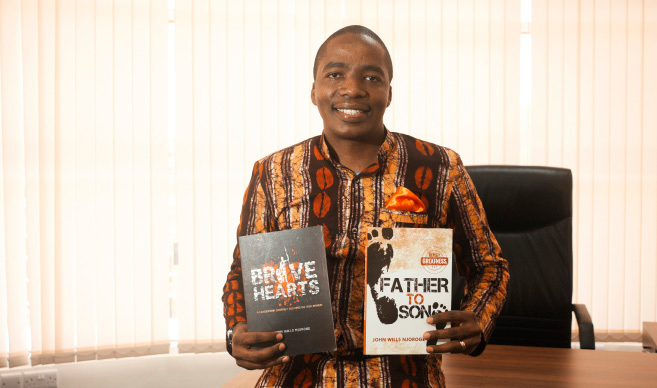 PIN IT
PIN ITWhat fruit will he find because there are seeds that have been sown? So ‘Father to Son’ is one of the books you have done?
Yes, and it has been an interesting journey, just having fathers embrace this journey, where they mentor their sons. And for biological fathers who are present, when they bring their sons for mentorship, sometimes I say, “No.” I’d rather work with the father, for him to mentor the son, because the relationship is long-term. Does it make business sense? No. But the good thing is, going back to the old lady, she told me when you work it out in a way that you support people, you will never lack. And she used to pray for me and for sure. I have never lacked.
Yeah, because it makes life sense. Absolutely. Because at the end of the day, if what you’re doing is giving fathers the tools they never had to be fathers to their sons, then what you’re doing is rebuilding an entire society. And the ripple effects are far greater than you have 30-minute mentorship sessions with young men.
True. I find it interesting because there’s a father, we had a conversation with and he had brought his son. I told him, “You know your son is not that he needs to be mentored by another man. All he needs is your attention and he needs to connect with you as a father.” And so we had an assessment for the father, and then for the son, and the father got to know that he is not present. I think that is one father that I truly celebrate because the following week, he resigned, from his workplace. He said, “You know, there is no way I can present a broken child to the world when I am making a lot of money here.” He had to reduce on what we would say, comfort to make sure he builds a son.
Then there’s this one time we had a conversation in a village somewhere with a group of old men. I think in total, there were about 12, 14 elderly men. And in total, we were joking with my wife, in total their age was almost 400 and something. And my wife was just telling me, “No, that’s huge.” So this group, after a ‘Father to Son’ session, I found that they were sad. Then, by the end of the day, as I was going home an elderly lady, in a marketplace somewhere, came running and she asked me, “Are you John, who was training our men here?” She gave me 200 shillings and she said, “Just accept this as my gift because you have brought my husband back home.” They had separated and it’s not separation where they were in different homes. No, they were in the same house, but living in different rooms. I have seen, I must say, with God’s help, I have seen their families transform, and it is possible for people to reconcile and live together.
Please tell us about ‘Brave Hearts’.
‘Brave Hearts: A leadership journey leaving no son behind.’ This one is a manual to assist boys, and especially teenagers, one, to know their purpose in life by articulating their vision. Then the other thing is to help them also to know where they are at in their developmental stages. Now the purpose of Brave Hearts is to create a community of young men who are driven by conviction and who are driven by truth and care for the society. A community of young men who truly love truth. And, by so doing, they excel economically, socially and they also excel as a society. And also as a way of mitigating bullying in schools, because one of the things is that bullies are cowards. So, what we’re trying to do with ‘Brave Hearts’ is to build courage among boys, to know actually, they can stand for truth. And last week, there’s a boy, an eight year old who went home and told the mom, “I just stopped a bully in school.” And I was very happy.’ That day is where you say that today I will sleep in my shoes. Just to celebrate the young man. So, everything is possible. And now with Brave Hearts, it’s actually connecting our social well-being with our governance, and encouraging these young men to participate in leadership and governance. It is not necessarily occupying a space somewhere or having an office somewhere as an MCA, senator, or something like that. But making sure in your home, in your village, in your community, there is truth, there is justice, and there is healing taking place. Because if you do so, no matter what people say and do, everything will be okay for your society.
Thank you. I want to talk about one group in society that I find, I don’t know if marginalized is the right word, considering that they have a large amount of wealth. But I just find that even socially speaking, the middle class are a group of people that seem to be more lost than ever, even in the middle of having a certain type of abundance. They have resources, they have homes, their children have clothes and food, they’re going to school but there’s an isolation that is happening in that group that keeps them living a fake life, even when they have pain, and also not participating in society, and contributing to society in a way that can positively transformative? What do you think is going on with the middle class? And how do we reach them with programs like these, and restore them to a place of accuracy? Because I think they can have a huge amount of impact.
I think I would respond with a question. Who are these people who isolate? Someone who is isolates is someone who is traumatized. And so how the middle class and how our society is behaving today, it is a result of social trauma. There is individual trauma and there is collective trauma. Collective trauma we have injustices, corruption, we have all those things. Individual trauma, what is happening at home, you find that there’s a lot of emotional abuse, there’s financial abuse where we control each other based on how much I earn, how much you earn.
And then the other thing is our definition of success. So, how I define success is maybe the car that I drive, maybe the place where I live, maybe the work that I do. And a good example is in this community where a child is misbehaving. And then there’s intervention from let’s say, the neighbors in that society. And then when this intervention, is disregarded and presented by someone who says, “You can’t even afford where I take my child to school.” But that’s not what we’re discussing. Here. We are discussing about a human being, but you’re still attaching this child’s identity to an institution. That institution can come to an end any time. But what will remain? So, I think for the middle class, one, is to address trauma. And then number two, to realize that true satisfaction is not in an institution, true satisfaction is not in how much you earn, or even the car that you drive, or in the school that you go to and all that. All those things contribute to, let’s say, your worldview. So the best way is, first to bring a sense of healing, and that is where I think I would say our conversations as a society should not actually start from our economic empowerment, we should start from addressing collective trauma, and addressing individual trauma as a people. Why do we have people insulting each other in organizations? Why do we have people bringing down each other in an organization? It’s simply because of trauma. So, where there’s pain, people tend to isolate where there is injustice, people tend to isolate. And what trauma does, drives someone to a place of feeling helpless. And so we learn how to be helpless. So, I can only do with bare minimum. And that’s where people graduate to. As long as it makes me happy, I will do it. Which is wrong.
What are the sources of this trauma?
Sources of this trauma, of course, we have injustices in our society. Like now there’s a child in prison I was asking this child, “What happened?” And the child says that, “I was framed by my stepmother.” And there are so many cases of stepmother-stepdad, stepmother-stepdad. So, simply it’s a broken family unit. And there’s also corruption because you’ll ask the child, “What happened?” They will say, “I went out stealing because I needed food.” That is poverty. So that one is advanced by this person holding an office somewhere misappropriating public funds. And then you meet another child and this child tells, you know, “Honestly, I don’t know, because I live with my grandmother. And my parents just decided I should be living with my grandmother and my grandmother is also tired of me.” So, what happens is that these children are acting out as a result of the pain they are going through. But we don’t want to address the pain, we want to rectify behavior. And sometimes we also want to medicate behavior. Sometimes it’s just a dysfunctional society. Because I remember there is this patient, a young child who came for psychotherapy in a public hospital. Then the mother said, “You need to make sure that he gets medicine.” I said, “No, no.” So, I asked the mother where she lives and she told me; it’s actually near a bus stop. And then they are building their nightclubs. And then what happens to such a child, ADHD?
But the question is why would you have someone having such an establishment in a residential area? It’s simply because of greed and it’s actually an element of isolation. So, it is fear driving this person to put up such an establishment in a residential area, because their definition of success is how much they get. So they will not think about the ripple effect. They will get their profits today, but ten years down the line, we’ll still have a child who has mental illness as a result of profits.
And meanwhile they’ve also been paying bribes to county officials so that they can maintain those facilities…
Yeah, because we have by-laws, so the question is how did this person end up putting up such an establishment there?
So there’s an entire chain in this whole ecosystem that supports the dysfunction, but all of it is dysfunctional up to the governorship, or the senatorship, or the presidency. Because no one is actually paying attention to what kind of society are we planning to harvest at the end of the day. It’s more like: No, we’re going to say that Kenya is successful because people are earning this much money and 3000 children more went to school this year, even if it was by force. We’re going to say that now we’re collecting more money in revenues even though they sent the revenue authority to arm-twist everybody and collect. So, the whole ecosystem is actually causing fear to thrive and people to be injured, who feel like they cant articulate their challenges. So, children are setting fire to schools but the reason for doing it is not even sorted out.
Yeah, it is not, and you see what I tell people is that we’re so preoccupied by our positions, that we forget we live in a community. And if we can look within then that means we’ll be able to address what is happening. And what happens in our society, especially when working with young people, you find that currently, we have so many young people resisting in different countries and sometimes we say, it is because of unemployment but even the ones who are employed are still reacting. So, unemployment is not necessarily the main issue. The main issue here is that we have a society that is dysfunctional and the only way to make this society functional is to make sure that we address collective, individual trauma, bring a sense of healing, because if e don’t do that we’ll just be bandaging situations and not dealing with the real issues. And I find that it is not just the people who are the middle class and all that, we have a sense of helplessness that makes us not value humanity because let’s say when someone is involved in an accident you’ll still find people stealing from the injured, and even others stealing from the dead. And so the question is what is happening? It’s because we are isolated socially, and we’re also isolated internally.
And the worst is internal isolation because by so doing there’s no connection between the brain, the heart, and your hands. So, there’s such distortion where what you’re thinking and how your heart, your soul is they’re totally different, and then what your hands are doing. So I tell people actually that internal isolation is worse than civil war.
So, this is why they’re trying to help fix foundational issues like parenting, or identity, or even working with institutions public institutions to try and help restore some kind of, I don’t know I guess it would be perspective, and humanity?
It’s human dignity and to restore human dignity, one, we must embrace doing what is right even when it’s uncomfortable. We must embrace justice and reconciliation, we must embrace that the core of a child’s development is giving that child love that they need. And love is not in things, love is connecting with the soul of that child. And it’s okay to make a child comfortable, but the most important thing is, is there human connection in that home, in that society? And also ensuring that we equip people on what to do, actually one of the things that I’m discouraging parents today is that when you see a young person, whether a girl or a boy misbehaving, please don’t call law enforcement. Intervene, try as much as you can to have a conversation with that child, because when you call law enforcement they’ll come and do their work, and a child who is broken, the child will be broken even more. I remember someone telling me that there are some issues in the society, or rather how a child behaves, that will require a child being taken to a police station. I know, yes, breaking the law and all those things, those things happen. But why do we get there? The reason we have 85% of boys and men in prison compared to 15, 14 percent of women in prison is simply that we are not engaging as a society. The reason why we have women every day crying of oppression even as the workplace is because we’re not engaging as men. So, for Brave Heart it is mainly to build a community and a society that will help these young people be responsible, and ten years from now we can have a connection in different Afrikan states where men are speaking the same language and it’s a language driven by vision and a language driven by unity.
Yesterday I was watching a documentary on South Afrikan communities; the Zulu and all that. And I realized the amount of wealth in our history, it’s something that we need to study because of the kind of unity that these people had, and then when you look at what broke the unity it’s capitalism. Every time that community was defeated it’s simply because of capitalism. And every time they defeated the enemy, those who had come to invade, it’s simply because they were functioning as human beings. And today, like I have friends who are pastoralists and these people, are not stressed, why, because they have human connection and they are not addicted as we are to profits and such things. And so I would say that, as Afrika we need to create conversation, then also know how to tell our stories, and it’s the other thing that we also encourage boys to do.
There’s this boy who had been released from a juvenile center and he was asking, “But since my records are wrong, will I ever get a job somewhere?” And my question to him was, “Why do you think you need a job?” And he said, “To make money.” “What else?” “To live a good life.” “What else?” “To live in a good neighborhood.” “And then what else?” And he said, “You have so many questions. Can you just give me a solution?” And so I told him, “Actually, what you need is to function as a human being and all those things that you have mentioned are motivated by fear. So, you ended up in prison because of resistance, you resisted something that you were not given a chance to express, so you ended up in prison. While prison, you were in denial that this thing is not happening, and that’s what elevated your stress and depression levels to manage the pain of rejection, of shame and guilt in prison. And then when you’re leaving prison, you have fear. So you still go back to where you were, so we need to address these three things.” And he said,”It’s okay.” So I asked him, “What do you want to do?” He said, “I want to learn more.” I told him, “Just go back to school. Just do that. When that time comes where someone requires you to see your records, then you’ll have a conversation around it, but be present. And what isolation also does, isolation makes you live in the past, or live in the future, you’re never present. And that’s why people don’t connect.
So you see why we had to talk to John Wills! It was absolutely imperative that you hear from the heart of someone who has stood up to pursue his mandate in repairing these breeches that exist in society what it’s like and what is going on behind the scenes that sometimes we’re just not honest with ourselves about. So, I just want to round up by saying this, if you want to connect with John Wills get in touch with us, we will put you in touch immediately.
I feel like there are people out there who are trying to figure out ways in which to roll out programs like he is and he already has this written down. We’ve told you oftentimes it’s not necessary to start from scratch, you can plug into people across the continent, find out what they’re doing and how they’re doing it, get content like this that you can immediately begin to implement on the ground and start to do the work of transforming. Of course, you’re going to adapt it to your local context so that it is more relevant, but in terms of getting foundational tools in order for you to be able to build and rebuild and reconstruct society the way that we need to and the way that we need to do with the speed that we need to do it with, partnerships, interactions, relationships are necessary. Afrika must once again become the connected vessel and tool that she needs to be in order for the hearts and the minds of men and women across the continent, young and old to be able to be restored and revitalized so that we can become and continue to be the life-giving spirits that we are meant to be because that is our role.
Thank you so much for watching today. Thank you for allowing us to have this time with you, we appreciate it.
Watch the interview here:
Subscribe now for updates from Msingi Afrika Magazine!
Receive notifications about new issues, products and offers.
What's Your Reaction?
 PIN IT
PIN ITPassionate about getting God's message concerning Afrika and the end times to the world, in order to heal, restore and rebirth Afrika to her true purpose and destiny in God.








